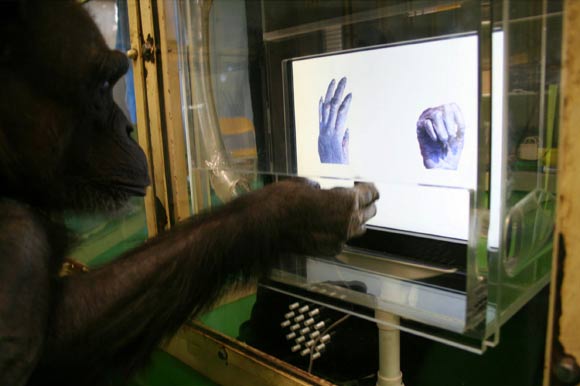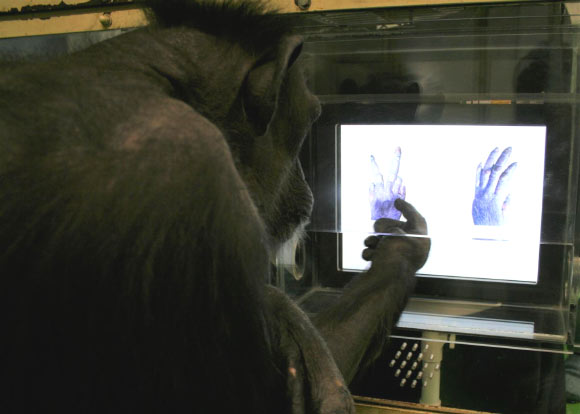Chimpanzees (Pan troglodytes) can understand the popular game in which ‘paper’ beats ‘rock,’ ‘rock’ beats ‘scissors,’ and ‘scissors’ beat ‘paper,’ according to a new study in the journal Primates.
In the study, a research team led Kyoto University scientists aimed to investigate whether chimpanzees could learn a transverse pattern by being trained in the rules of the rock-paper-scissors game.
“The relationship between the signals are non-linear and must be understood within the context of how the pairs are grouped,” the researchers explained.
“Learning such transverse patterns requires enhanced mental capacity. Being able to do so is useful when forming complex relationship networks, solving problems, or updating what you already know about a subject.”
The study involved seven chimpanzees living in the Primate Research Institute at Kyoto University, Japan.
“The chimpanzees sat in a booth housing a computer-based touch screen and were trained to choose the stronger of two options (based on the rules of the game) they saw on screen,” the scientists said.
“They first learnt the ‘paper-rock’ sequence, then the ‘rock-scissors’ one and finally ‘scissors-paper’.”
“Once they knew how the pairs fitted together, all the different pairs were randomly presented to them on screen.”
“Five of the seven chimpanzees completed training after a mean of 307 sessions, which indicates that they learned the circular pattern.”
“The chimpanzees required more ‘scissors-paper’ sessions, the third learnt pair, than ‘paper-rock’ and ‘rock-scissors’ sessions, suggesting they had difficulty finalizing the circularity.”
The authors also taught 38 preschool children the game to compare the learning process of chimpanzees with that of humans aged three to six.
“The children had little difficulty grasping the game, and on average did so within five sessions,” they said.
“Their performance was, however, subject to age. The older the children were, the more accurate they became when all three pairs were randomly presented to them. Participants older than 4 years played the game with more skill rather than luck.”
“This suggests that children acquire the ability to learn a circular relationship and to solve a transverse patterning problem around the age of four years,” added lead author Dr. Jie Gao, of Kyoto University and Peking University.
“The chimpanzees’ performance during the mixed-pair sessions was similar to that of 4-year-old children.”
“We hope our findings will inspire future studies into how age and sex influence the ability of members of various species to learn circular relationships.”
_____
Jie Gao et al. Learning the rules of the rock-paper-scissors game: chimpanzees versus children. Primates, published online August 10, 2017; doi: 10.1007/s10329-017-0620-0









